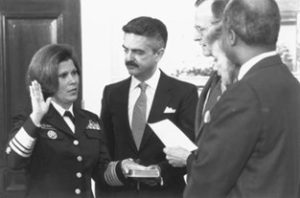June is Caribbean Heritage Month, and we are pleased to honor two notable Americans of Caribbean heritage.

In 1990 Antonia C. Novello, M.D., M.P.H., Dr.P.H, who was born in Puerto Rico, was appointed as the first female and first Hispanic U.S. Surgeon General by President George Bush.
Dr. Novello received both her undergraduate and medical degrees from the University of Puerto Rico, and completed her residency at the University of Michigan and a fellowship at Georgetown.
Dr. Novello married a flight surgeon after medical school, and not long after completing her training she joined the U.S. Public Health Service Commissioned Corps.
(See https://cfmedicine.nlm.nih.gov/physicians/biography_239.html & https://www.womenshistory.org/education-resources/biographies/antonia-novello.)

Cuban American Alejandro Mayorkas was appointed Secretary of Homeland Security by President Joe Biden in February 2021.
Formerly a lawyer and law enforcement official, he is the first Latino and the first immigrant ever to hold this position.
Between 2013 and 2016, he held the position of Deputy Secretary of the U.S. Department of Homeland Security during which he led the development and implementation of DACA.
(See https://www.dhs.gov/person/alejandro-mayorkas & https://hiplatina.com/noteable-caribbean-americans/.)
To learn more about these or other Americans of Caribbean heritage, or for other research questions, search our Law Library Catalog or Ask A Librarian.